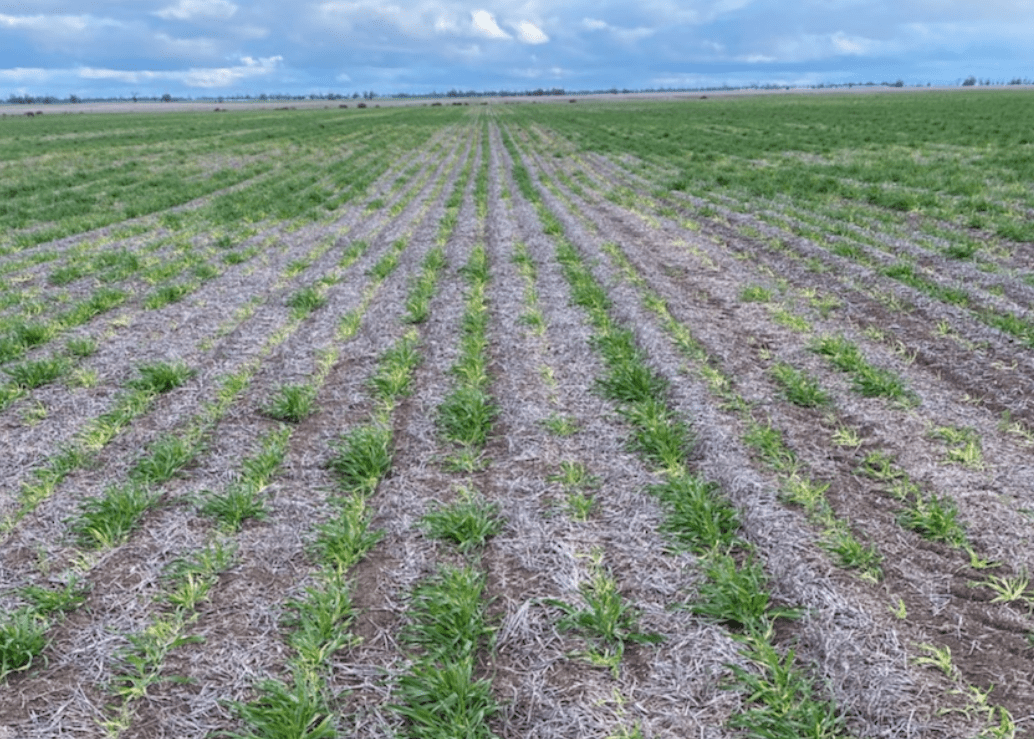
A barley crop which the grower claims has been adversely affected by Overwatch. Photo: Levitt Robinson
GROWERS who allege they have suffered barley yield losses through unintended consequences caused by the use of the herbicide Overwatch are being invited to take part in a class action.
Proposed by Sydney-based law firm Levitt Robertson, the action seeks to represent affected growers in Western Australian, Victorian and South Australia and possibly New South Wales.
Through the Class PR website, the firm alleges Overwatch has bleached some barley crops, some of which will not recover their full yield potential.
Manufactured by chemical company FMC, Overwatch is a pre-emergent herbicide marketed as being suitable to control weeds including annual ryegrass in southern Australia’s three biggest winter crops: barley, canola and wheat.
“Although Overwatch worked brilliantly with some crops, it was FMC’s failure to steward the administration of the product and have farmers adjust their sowing systems by using a deeper planting method, which led to crop damage,” the website alleges.
The website states that FMC recommended the same application rate for barley as for wheat and canola, and agronomists advising growers were not provided with “crucial product information by FMC” which could have prevented the alleged damage.
Levitt Robinson is putting out the feelers to see if a “critical mass” of farming participants can be found in order to make the running of a class action feasible.
It is holding a series of webinars over coming weeks to inform growers about the process involved so they can decide whether or not to join the action.
It said interested growers needed to register as soon as possible.
Levitt Robinson successes in class actions include one on behalf of Storm Financial investors and franchisees of 7-Eleven.
Levitt Robinson special counsel Brett Imlay said the firm was looking into a class action on behalf of growers following an approach several weeks ago from a party in the Victorian Wimmera.
FMC response
FMC has issued the following holding statement in response to the proposed legal action:
FMC confirms that it is aware that a law firm has called on growers who are concerned about lingering crop effects following the use of Overwatch Herbicide in barley to work with the firm, though no action has been filed.
FMC is currently investigating reports relating to enhanced bleaching in crops where Overwatch Herbicide has been used on a case-by-case basis, as much as COVID-19 travel guidelines allow. The incidence of enhanced bleaching is currently estimated at one percent or less of the total crop area treated with Overwatch Herbicide in Australia this year.
FMC takes its stewardship role very seriously and has a long-standing reputation for working closely with growers to ensure safe and responsible use of its products. FMC will continue to monitor the situation and work with concerned growers and industry partners to support Overwatch® users as required for each case.
Maiden year
Overwatch was released to the Australian market this year following approval by the Australian Pesticides and Veterinary Medicines Authority (APVMA).
FMC’s Overwatch Herbicide website states its active ingredient Bixlozone, trademarked Isoflex active, is a Group Q molecule, which makes it a unique weed control option in the Australian broadacre market.
FMC Corporation is listed on the New York Stock Exchange, and develops and produces herbicides, fungicides and pesticides for the global agricultural and horticultural chemical market.
Sources: Class PR, FMC, Levitt Robinson



This season we used Overwatch for the first time on 50pc of our wheat plantings. The decision to do so was to try to incorporate a new control methodology to counteract ryegrass in our cropping rotations. The remainder of the cropping area had other chemical regimes applied. All of the wheat acreage had previous stubble and grass residues burnt, to also counteract snail and mouse activity. With good advice, we sowed our crops with good precision, but like many others, had the deleterious bleaching effects appearing from day one after sowing. Enough of the crops were affected to cause angst. It appeared as though the chemical was constantly being flushed into the sowing rows, with every rain event we experienced, in a very wet July, recording 94mm. The crops stalled in their growing phase, reducing yield prospects even though, to attempt to get things going, we applied substantially more post sowing nitrogen nutrition than we had anticipated doing. Considerably more cost, with not much to show for it. The grass control achieved was quite variable also. We will be carefully considering our options next season?